Module 3 Journey to space Unit 3 Language in use 课件(共29张PPT)
文档属性
| 名称 | Module 3 Journey to space Unit 3 Language in use 课件(共29张PPT) | 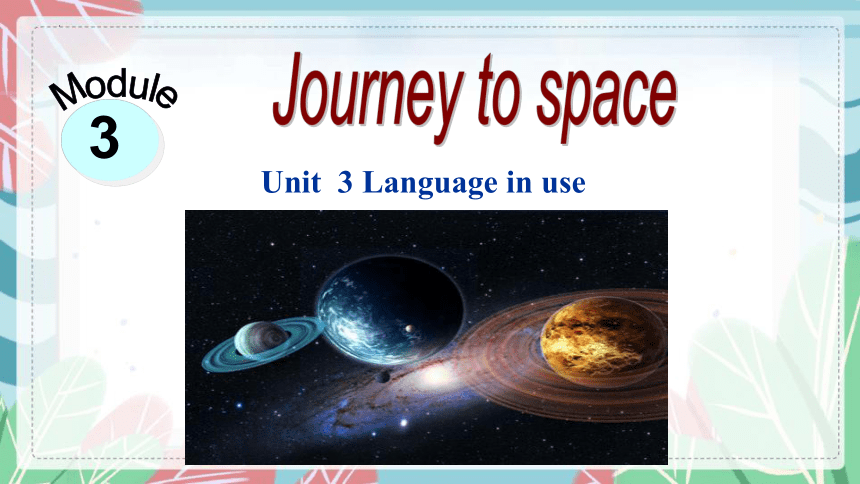 | |
| 格式 | pptx | ||
| 文件大小 | 3.6MB | ||
| 资源类型 | 试卷 | ||
| 版本资源 | 外研版 | ||
| 科目 | 英语 | ||
| 更新时间 | 2023-02-17 10:55:06 | ||
图片预览

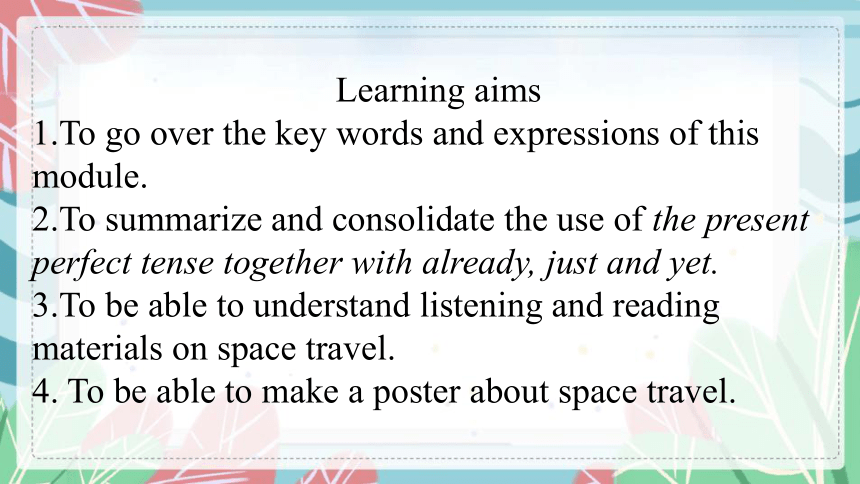
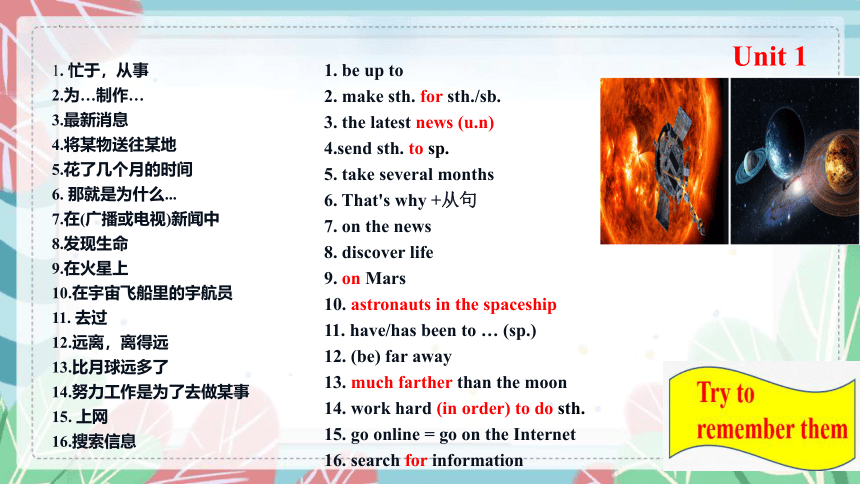
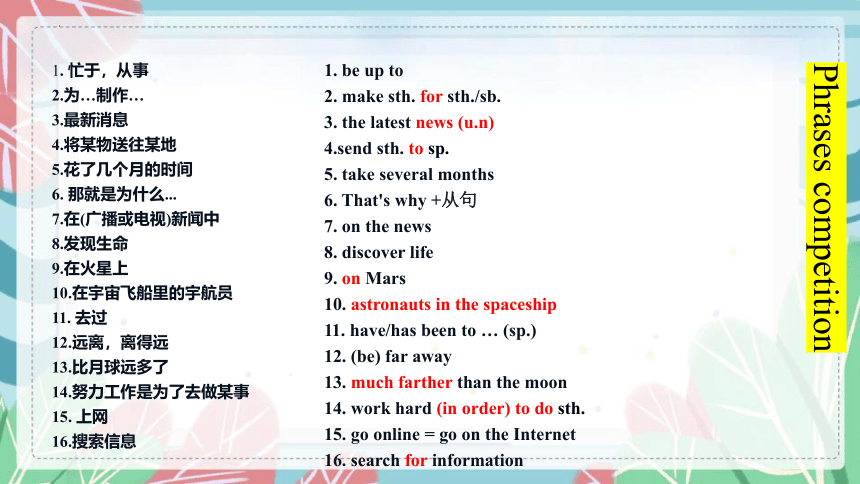
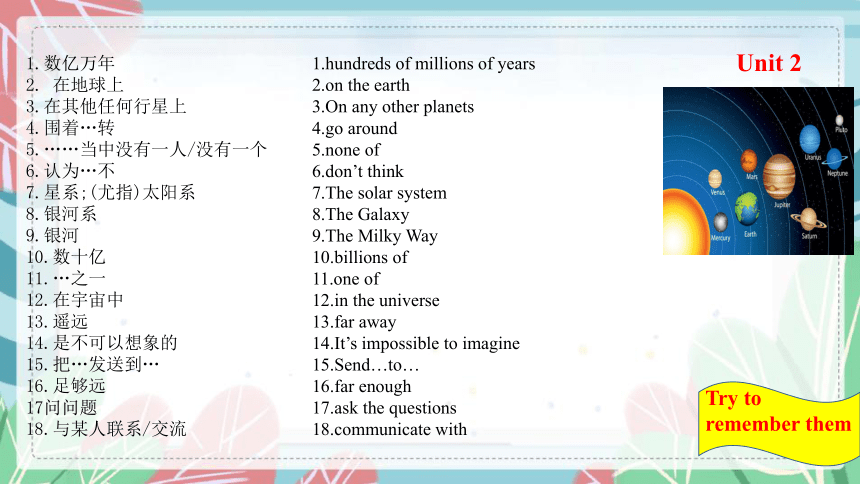
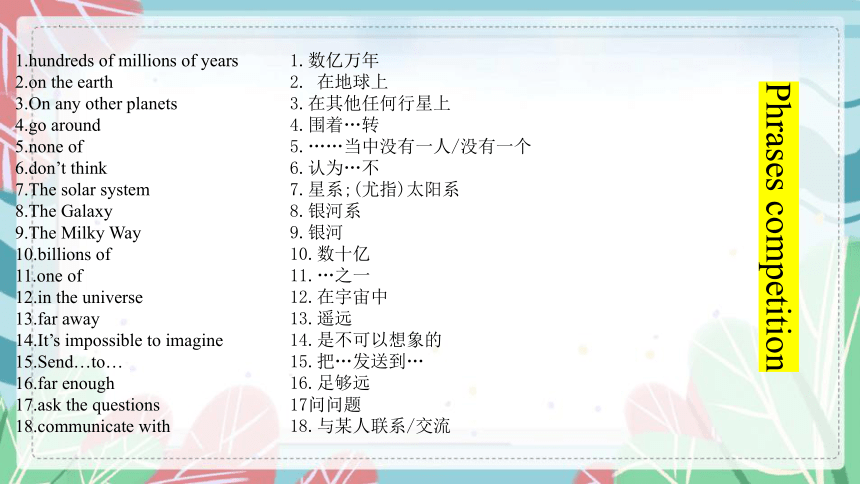
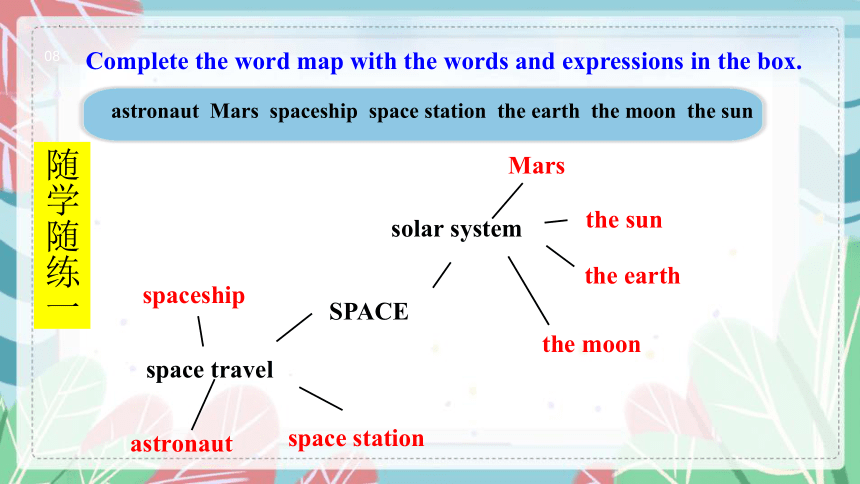
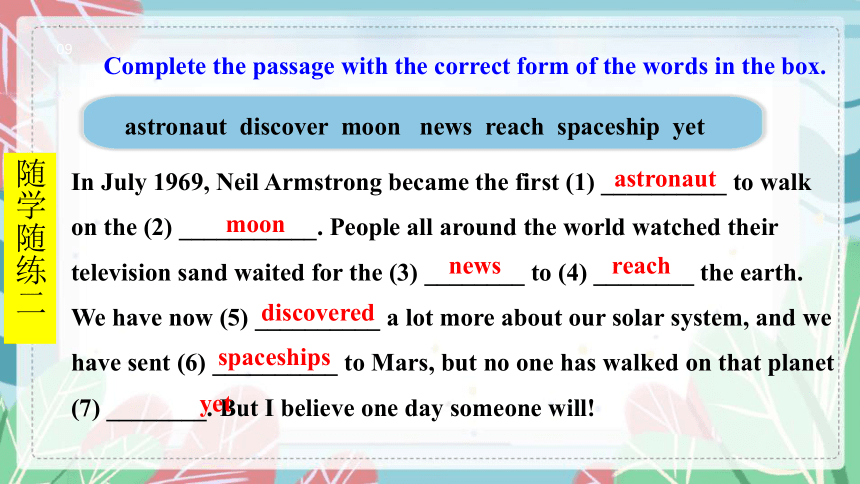
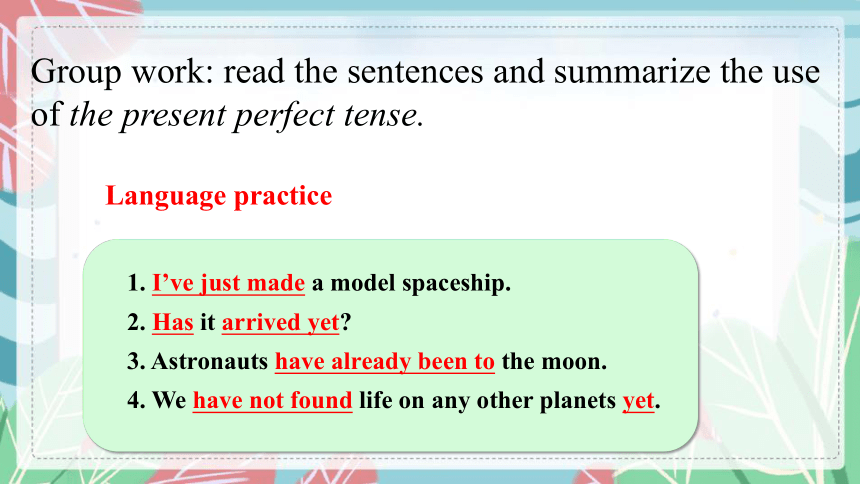
文档简介
(共29张PPT)
3
Journey to space
Module
Unit 3 Language in use
Learning aims
1.To go over the key words and expressions of this module.
2.To summarize and consolidate the use of the present perfect tense together with already, just and yet.
3.To be able to understand listening and reading materials on space travel.
4. To be able to make a poster about space travel.
Unit 1
1. 忙于,从事
2.为…制作…
3.最新消息
4.将某物送往某地
5.花了几个月的时间
6. 那就是为什么...
7.在(广播或电视)新闻中
8.发现生命
9.在火星上
10.在宇宙飞船里的宇航员
11. 去过
12.远离,离得远
13.比月球远多了
14.努力工作是为了去做某事
15. 上网
16.搜索信息
1. be up to
2. make sth. for sth./sb.
3. the latest news (u.n)
4.send sth. to sp.
5. take several months
6. That's why +从句
7. on the news
8. discover life
9. on Mars
10. astronauts in the spaceship
11. have/has been to … (sp.)
12. (be) far away
13. much farther than the moon
14. work hard (in order) to do sth.
15. go online = go on the Internet
16. search for information
Phrases competition
1. 忙于,从事
2.为…制作…
3.最新消息
4.将某物送往某地
5.花了几个月的时间
6. 那就是为什么...
7.在(广播或电视)新闻中
8.发现生命
9.在火星上
10.在宇宙飞船里的宇航员
11. 去过
12.远离,离得远
13.比月球远多了
14.努力工作是为了去做某事
15. 上网
16.搜索信息
1. be up to
2. make sth. for sth./sb.
3. the latest news (u.n)
4.send sth. to sp.
5. take several months
6. That's why +从句
7. on the news
8. discover life
9. on Mars
10. astronauts in the spaceship
11. have/has been to … (sp.)
12. (be) far away
13. much farther than the moon
14. work hard (in order) to do sth.
15. go online = go on the Internet
16. search for information
Try to remember them
Unit 2
1.数亿万年
2. 在地球上
3.在其他任何行星上
4.围着…转
5.……当中没有一人/没有一个
6.认为…不
7.星系;(尤指)太阳系
8.银河系
9.银河
10.数十亿
11.…之一
12.在宇宙中
13.遥远
14.是不可以想象的
15.把…发送到…
16.足够远
17问问题
18.与某人联系/交流
1.hundreds of millions of years
2.on the earth
3.On any other planets
4.go around
5.none of
6.don’t think
7.The solar system
8.The Galaxy
9.The Milky Way
10.billions of
11.one of
12.in the universe
13.far away
14.It’s impossible to imagine
15.Send…to…
16.far enough
17.ask the questions
municate with
Phrases competition
1.hundreds of millions of years
2.on the earth
3.On any other planets
4.go around
5.none of
6.don’t think
7.The solar system
8.The Galaxy
9.The Milky Way
10.billions of
11.one of
12.in the universe
13.far away
14.It’s impossible to imagine
15.Send…to…
16.far enough
17.ask the questions
municate with
1.数亿万年
2. 在地球上
3.在其他任何行星上
4.围着…转
5.……当中没有一人/没有一个
6.认为…不
7.星系;(尤指)太阳系
8.银河系
9.银河
10.数十亿
11.…之一
12.在宇宙中
13.遥远
14.是不可以想象的
15.把…发送到…
16.足够远
17问问题
18.与某人联系/交流
SPACE
space travel
solar system
astronaut
Mars
spaceship
space station
the earth
the moon
the sun
Complete the word map with the words and expressions in the box.
08
astronaut Mars spaceship space station the earth the moon the sun
随学随练一
Complete the passage with the correct form of the words in the box.
In July 1969, Neil Armstrong became the first (1) __________ to walk on the (2) ___________. People all around the world watched their television sand waited for the (3) ________ to (4) ________ the earth. We have now (5) __________ a lot more about our solar system, and we have sent (6) __________ to Mars, but no one has walked on that planet (7) ________. But I believe one day someone will!
astronaut
moon
astronaut discover moon news reach spaceship yet
news
reach
discovered
spaceships
yet
09
随学随练二
Language practice
Group work: read the sentences and summarize the use of the present perfect tense.
1. I’ve just made a model spaceship.
2. Has it arrived yet
3. Astronauts have already been to the moon.
4. We have not found life on any other planets yet.
现在完成时是指“过去发生的动作对现在造成了影响”而且“过去的动作或状态持续到现在并且已经完成”。在现在完成时的句子中,already (已经)、just(刚刚)常用于肯定句,放在have和has的后面。yet(还、尚、仍然)常用于否定句和疑问句,(放在have和has的后面也可放在句末)。
现在完成时(1)
现在完成时(2)
当表示动作已经完成,并对现在有一定影响时,我们一般用现在完成时。同时,可分别用just, already或yet加以强调或说明。
例:I have just heard the news. 我刚听到消息。
Eg: Astronauts have already been to the moon.
宇航员已经去过月球了。
He has just started to explore other planets.
我们才刚刚开始探索其他行星。
可以看出,just用来表示“刚刚”, already用来表示“已经”,两者都用于肯定句中,一般是置于have / has之后。在否定句中则可用yet, 表示“还未”, 有“以后可以会”的含义。
现在完成时与一般过去时
现在完成时表示该事件是在现在之前
的某一个时间里发生的,
重点在于强调这一动作对
现在的影响
一般过去时只表示过去的某一具体时
间发生的事情
I have just been to London. I went there last month.
我刚去过伦敦,是上个月去的。
I have already finished my homework. I finished it an hour ago.
我已经写完作业了,一个小时之前完成的。
注意:在没有明确的过去时间状语时,如何判断该用现在完成时还是该用过去时呢?判断的标准是看该行为是否对现在有影响,也就是说该句强调的是什么。试看以下对话:
A: Where have you put my book I can’t find it.
你把我的书放哪儿去了?我找不到它。
B: I put it on your desk yesterday. 我昨天放你桌子上了。
该对话中,当A问对方把自己的书放在何处时,A 感兴趣的是现在的状态,因此用现在完成时。但是B回答时只是说明当时放的位置,所以用一般过去时。再看下面的对话:
A: Would you like to go and see the film with me tonight
你今晚想和我去看电影吗?
B: Sorry, I have seen it already.
不好意思,我已经看过那部电影了。
对话中的现在完成时表示对结果的强调:“电影看过了,所以不想再看了。
【辨析】have been to 与 have gone to
(1)have gone to表示“已到达某地”。说话时该人不在现场,强调尚未回来(go是方向性动词)。
例:—Where is Jim 吉姆在哪里?
—He has gone to Beijing 他去北京了。
(2)have been to表示“曾经去过某地”。现在已经不在那里了(be是表示状态),后可接次数,如once、twice、three times等,表示“去过某地几次”。也可和just、never和ever等连用。
例:I have been to Beijing twice. 我去过北京两次。
【拓展】have been at/in表示“在某地待了多少时间”,常与时间段状语连用。
例:I have been in Shanghai for three years. 我来上海已有三年了。
Spaceship on Mars!
Astronauts have (1) ________ been to the moon but they have not been to any other planets. However, a spaceship has (2) _______ arrived on Mars and it has (3) _______ sent back photos of the red planet. Is there life on Mars We do not know (4) ________.
already
just
already
yet
Complete the news with already, just and yet.
01
随学随练一
The spaceship has gone to Mars.
It has gone there, but it has not come back yet.
Astronauts have been to the moon.
They went there and then they came back.
Look at these sentences.
随学随练二
1. Astronauts have been / gone to the moon and returned.
2. The spaceship has been / gone into space. It will travel for
ten days.
Now choose the correct answer.
3. The astronaut has been / gone to the space station. He will
come back tomorrow.
4. The spaceship has been / gone to the space station. It
brought back two astronauts.
Complete the sentences with the expressions in the box.
1. A spaceship ____________ to Mars. It is coming back to the earth next year.
has gone
2. Lots of astronauts ___________ to the space station. They found it
very interesting.
3. Some astronauts ____________ to the moon twice.
4. Two British astronauts__________ to the space station.
They will come back in January.
have been
have been
have gone
have / has been have / has gone
03
随学随练三
Nicky: I’ve just (1) ________ (watch) a great TV programme about
space. Did you know that scientists have (2) __________
(discover) water on Mars
Bill: Yes, I did. And scientists (3) __________ (try) to find life on
Mars now.
watched
discovered
are trying
Complete the conversation with the correct form of the verbs in brackets.
Nicky: Yes, they’re looking for life but they (4) ____________ (not
find) anything yet.
Bill: There were some new photos of Mars in the newspaper
today. (5) _______ you ______ (see) them yet
Nicky: Yes. They’re amazing!
haven’t found
Have seen
随学随练四
Complete the email with the words in the box.
been just met never read written yet
read
been
never
met
written
yet
just
随学随练五
(2022·重庆)-Where is your uncle I haven‘t seen him for a long time.
-He Beijing for about half a year. He moved there in January .
has gone to B. has been to
C. has arrived in. D. has been in
中考·链接
解析:我们可用“用法辨析法”解答此题。hasgone to 意为“去某地了,还未回到原地”has been to意为“到过某地,现已回到原地”has arrived in 意为“已到达某地”;has been in 意为“已在某地”。前三者都是非延续性动词短语,不可与时间段连用。has been in是延续性动词短语,可与时间段连用。根据for about half a year 为时间段可知,选D。句意:“你叔叔在哪里 我好长时间没看见他”“他在北京大约半年了。他一月份搬到那儿的。答案:D
Many European languages use the names of the heavenly bodies for the days of the week. For example, in English, Saturday is named after the planet Saturn, the sixth planet from the sun. Sunday is the day of the sun, a traditional day of rest. Monday gets its name from the moon and is the day of the moon.
Names of the days of the week
天体
土星
传统休息日
Sunday(星期日):这是一周中的第一天。太阳(sun)在北欧人的心目中是极其神圣的。为了表示对太阳的敬仰,人们把每周的第一天命名为Sunday。
Monday(星期一):这是一周中的第二天。为了表达对月亮(moon)的敬仰,人们把这一天称作moon day,后来演变为Monday。
Tuesday(星晴二):这是一周中的第三天。北欧神话里有一个战神叫做Tyr,他机智勇敢,守护人类的平安。为了纪念他,英语中就以他的名字命名为星期二。
Wednesday(星期三):是以北欧神话中的主神Woden的名字命名的。Woden是北欧神话中掌管文化、艺术、战争等的最高神。
Thursday(星期四):是以北欧神话中的雷神Thor的名字命名的。Thor是北欧神话中最强大、最勇敢的神,是雷电之神。
Friday(星期五):是以爱神的名字命名的。北欧神话中的爱神、婚姻女神叫做Frigga,相当于罗马神话中的“维纳斯”。
Saturday(星期六):这是一周中的第七天。它是以罗马的农神Saturn的名字命名的。因此是“农神日”,是唯一保留罗马名称的一天。
英语星期的表达来历
Work in groups. Choose a subject, for example, the first moon landing or China’s manned space travels. Look for some photos and information about it.
Making a poster about space travel
Module task:
10
Write captions for the photos and use the information you found in Activity 10 to write a description of each one.
Give your poster a title. Put it up for your classmates to see.
11
12
Homework
must do
1.preview M4U1
2.finish Exercise 7 on Page 25
choose to do
To make a poster about space travel.
谢谢
21世纪教育网(www.21cnjy.com)
中小学教育资源网站
兼职招聘:
https://www.21cnjy.com/recruitment/home/admin
3
Journey to space
Module
Unit 3 Language in use
Learning aims
1.To go over the key words and expressions of this module.
2.To summarize and consolidate the use of the present perfect tense together with already, just and yet.
3.To be able to understand listening and reading materials on space travel.
4. To be able to make a poster about space travel.
Unit 1
1. 忙于,从事
2.为…制作…
3.最新消息
4.将某物送往某地
5.花了几个月的时间
6. 那就是为什么...
7.在(广播或电视)新闻中
8.发现生命
9.在火星上
10.在宇宙飞船里的宇航员
11. 去过
12.远离,离得远
13.比月球远多了
14.努力工作是为了去做某事
15. 上网
16.搜索信息
1. be up to
2. make sth. for sth./sb.
3. the latest news (u.n)
4.send sth. to sp.
5. take several months
6. That's why +从句
7. on the news
8. discover life
9. on Mars
10. astronauts in the spaceship
11. have/has been to … (sp.)
12. (be) far away
13. much farther than the moon
14. work hard (in order) to do sth.
15. go online = go on the Internet
16. search for information
Phrases competition
1. 忙于,从事
2.为…制作…
3.最新消息
4.将某物送往某地
5.花了几个月的时间
6. 那就是为什么...
7.在(广播或电视)新闻中
8.发现生命
9.在火星上
10.在宇宙飞船里的宇航员
11. 去过
12.远离,离得远
13.比月球远多了
14.努力工作是为了去做某事
15. 上网
16.搜索信息
1. be up to
2. make sth. for sth./sb.
3. the latest news (u.n)
4.send sth. to sp.
5. take several months
6. That's why +从句
7. on the news
8. discover life
9. on Mars
10. astronauts in the spaceship
11. have/has been to … (sp.)
12. (be) far away
13. much farther than the moon
14. work hard (in order) to do sth.
15. go online = go on the Internet
16. search for information
Try to remember them
Unit 2
1.数亿万年
2. 在地球上
3.在其他任何行星上
4.围着…转
5.……当中没有一人/没有一个
6.认为…不
7.星系;(尤指)太阳系
8.银河系
9.银河
10.数十亿
11.…之一
12.在宇宙中
13.遥远
14.是不可以想象的
15.把…发送到…
16.足够远
17问问题
18.与某人联系/交流
1.hundreds of millions of years
2.on the earth
3.On any other planets
4.go around
5.none of
6.don’t think
7.The solar system
8.The Galaxy
9.The Milky Way
10.billions of
11.one of
12.in the universe
13.far away
14.It’s impossible to imagine
15.Send…to…
16.far enough
17.ask the questions
municate with
Phrases competition
1.hundreds of millions of years
2.on the earth
3.On any other planets
4.go around
5.none of
6.don’t think
7.The solar system
8.The Galaxy
9.The Milky Way
10.billions of
11.one of
12.in the universe
13.far away
14.It’s impossible to imagine
15.Send…to…
16.far enough
17.ask the questions
municate with
1.数亿万年
2. 在地球上
3.在其他任何行星上
4.围着…转
5.……当中没有一人/没有一个
6.认为…不
7.星系;(尤指)太阳系
8.银河系
9.银河
10.数十亿
11.…之一
12.在宇宙中
13.遥远
14.是不可以想象的
15.把…发送到…
16.足够远
17问问题
18.与某人联系/交流
SPACE
space travel
solar system
astronaut
Mars
spaceship
space station
the earth
the moon
the sun
Complete the word map with the words and expressions in the box.
08
astronaut Mars spaceship space station the earth the moon the sun
随学随练一
Complete the passage with the correct form of the words in the box.
In July 1969, Neil Armstrong became the first (1) __________ to walk on the (2) ___________. People all around the world watched their television sand waited for the (3) ________ to (4) ________ the earth. We have now (5) __________ a lot more about our solar system, and we have sent (6) __________ to Mars, but no one has walked on that planet (7) ________. But I believe one day someone will!
astronaut
moon
astronaut discover moon news reach spaceship yet
news
reach
discovered
spaceships
yet
09
随学随练二
Language practice
Group work: read the sentences and summarize the use of the present perfect tense.
1. I’ve just made a model spaceship.
2. Has it arrived yet
3. Astronauts have already been to the moon.
4. We have not found life on any other planets yet.
现在完成时是指“过去发生的动作对现在造成了影响”而且“过去的动作或状态持续到现在并且已经完成”。在现在完成时的句子中,already (已经)、just(刚刚)常用于肯定句,放在have和has的后面。yet(还、尚、仍然)常用于否定句和疑问句,(放在have和has的后面也可放在句末)。
现在完成时(1)
现在完成时(2)
当表示动作已经完成,并对现在有一定影响时,我们一般用现在完成时。同时,可分别用just, already或yet加以强调或说明。
例:I have just heard the news. 我刚听到消息。
Eg: Astronauts have already been to the moon.
宇航员已经去过月球了。
He has just started to explore other planets.
我们才刚刚开始探索其他行星。
可以看出,just用来表示“刚刚”, already用来表示“已经”,两者都用于肯定句中,一般是置于have / has之后。在否定句中则可用yet, 表示“还未”, 有“以后可以会”的含义。
现在完成时与一般过去时
现在完成时表示该事件是在现在之前
的某一个时间里发生的,
重点在于强调这一动作对
现在的影响
一般过去时只表示过去的某一具体时
间发生的事情
I have just been to London. I went there last month.
我刚去过伦敦,是上个月去的。
I have already finished my homework. I finished it an hour ago.
我已经写完作业了,一个小时之前完成的。
注意:在没有明确的过去时间状语时,如何判断该用现在完成时还是该用过去时呢?判断的标准是看该行为是否对现在有影响,也就是说该句强调的是什么。试看以下对话:
A: Where have you put my book I can’t find it.
你把我的书放哪儿去了?我找不到它。
B: I put it on your desk yesterday. 我昨天放你桌子上了。
该对话中,当A问对方把自己的书放在何处时,A 感兴趣的是现在的状态,因此用现在完成时。但是B回答时只是说明当时放的位置,所以用一般过去时。再看下面的对话:
A: Would you like to go and see the film with me tonight
你今晚想和我去看电影吗?
B: Sorry, I have seen it already.
不好意思,我已经看过那部电影了。
对话中的现在完成时表示对结果的强调:“电影看过了,所以不想再看了。
【辨析】have been to 与 have gone to
(1)have gone to表示“已到达某地”。说话时该人不在现场,强调尚未回来(go是方向性动词)。
例:—Where is Jim 吉姆在哪里?
—He has gone to Beijing 他去北京了。
(2)have been to表示“曾经去过某地”。现在已经不在那里了(be是表示状态),后可接次数,如once、twice、three times等,表示“去过某地几次”。也可和just、never和ever等连用。
例:I have been to Beijing twice. 我去过北京两次。
【拓展】have been at/in表示“在某地待了多少时间”,常与时间段状语连用。
例:I have been in Shanghai for three years. 我来上海已有三年了。
Spaceship on Mars!
Astronauts have (1) ________ been to the moon but they have not been to any other planets. However, a spaceship has (2) _______ arrived on Mars and it has (3) _______ sent back photos of the red planet. Is there life on Mars We do not know (4) ________.
already
just
already
yet
Complete the news with already, just and yet.
01
随学随练一
The spaceship has gone to Mars.
It has gone there, but it has not come back yet.
Astronauts have been to the moon.
They went there and then they came back.
Look at these sentences.
随学随练二
1. Astronauts have been / gone to the moon and returned.
2. The spaceship has been / gone into space. It will travel for
ten days.
Now choose the correct answer.
3. The astronaut has been / gone to the space station. He will
come back tomorrow.
4. The spaceship has been / gone to the space station. It
brought back two astronauts.
Complete the sentences with the expressions in the box.
1. A spaceship ____________ to Mars. It is coming back to the earth next year.
has gone
2. Lots of astronauts ___________ to the space station. They found it
very interesting.
3. Some astronauts ____________ to the moon twice.
4. Two British astronauts__________ to the space station.
They will come back in January.
have been
have been
have gone
have / has been have / has gone
03
随学随练三
Nicky: I’ve just (1) ________ (watch) a great TV programme about
space. Did you know that scientists have (2) __________
(discover) water on Mars
Bill: Yes, I did. And scientists (3) __________ (try) to find life on
Mars now.
watched
discovered
are trying
Complete the conversation with the correct form of the verbs in brackets.
Nicky: Yes, they’re looking for life but they (4) ____________ (not
find) anything yet.
Bill: There were some new photos of Mars in the newspaper
today. (5) _______ you ______ (see) them yet
Nicky: Yes. They’re amazing!
haven’t found
Have seen
随学随练四
Complete the email with the words in the box.
been just met never read written yet
read
been
never
met
written
yet
just
随学随练五
(2022·重庆)-Where is your uncle I haven‘t seen him for a long time.
-He Beijing for about half a year. He moved there in January .
has gone to B. has been to
C. has arrived in. D. has been in
中考·链接
解析:我们可用“用法辨析法”解答此题。hasgone to 意为“去某地了,还未回到原地”has been to意为“到过某地,现已回到原地”has arrived in 意为“已到达某地”;has been in 意为“已在某地”。前三者都是非延续性动词短语,不可与时间段连用。has been in是延续性动词短语,可与时间段连用。根据for about half a year 为时间段可知,选D。句意:“你叔叔在哪里 我好长时间没看见他”“他在北京大约半年了。他一月份搬到那儿的。答案:D
Many European languages use the names of the heavenly bodies for the days of the week. For example, in English, Saturday is named after the planet Saturn, the sixth planet from the sun. Sunday is the day of the sun, a traditional day of rest. Monday gets its name from the moon and is the day of the moon.
Names of the days of the week
天体
土星
传统休息日
Sunday(星期日):这是一周中的第一天。太阳(sun)在北欧人的心目中是极其神圣的。为了表示对太阳的敬仰,人们把每周的第一天命名为Sunday。
Monday(星期一):这是一周中的第二天。为了表达对月亮(moon)的敬仰,人们把这一天称作moon day,后来演变为Monday。
Tuesday(星晴二):这是一周中的第三天。北欧神话里有一个战神叫做Tyr,他机智勇敢,守护人类的平安。为了纪念他,英语中就以他的名字命名为星期二。
Wednesday(星期三):是以北欧神话中的主神Woden的名字命名的。Woden是北欧神话中掌管文化、艺术、战争等的最高神。
Thursday(星期四):是以北欧神话中的雷神Thor的名字命名的。Thor是北欧神话中最强大、最勇敢的神,是雷电之神。
Friday(星期五):是以爱神的名字命名的。北欧神话中的爱神、婚姻女神叫做Frigga,相当于罗马神话中的“维纳斯”。
Saturday(星期六):这是一周中的第七天。它是以罗马的农神Saturn的名字命名的。因此是“农神日”,是唯一保留罗马名称的一天。
英语星期的表达来历
Work in groups. Choose a subject, for example, the first moon landing or China’s manned space travels. Look for some photos and information about it.
Making a poster about space travel
Module task:
10
Write captions for the photos and use the information you found in Activity 10 to write a description of each one.
Give your poster a title. Put it up for your classmates to see.
11
12
Homework
must do
1.preview M4U1
2.finish Exercise 7 on Page 25
choose to do
To make a poster about space travel.
谢谢
21世纪教育网(www.21cnjy.com)
中小学教育资源网站
兼职招聘:
https://www.21cnjy.com/recruitment/home/admin
同课章节目录
- Module 1 Feelings and impressions
- Unit 1 It smells delicious.
- Unit 2 I feel nervous when I speak Chinese .
- Unit 3 Language in use
- Module 2 Experiences
- Unit 1 I've also entered lots of speaking competi
- Unit 2 They have seen the Pyramids.
- Unit 3 Language in use
- Module 3 Journey to space
- Unit 1 Has it arrived yet?
- Unit 2 We have not found life on any other planet
- Unit 3 Language in use
- Module 4 Seeing the docto
- Unit 1 I haven't done much exercise since I got m
- Unit 2 We have played football for a year now
- Unit 3 Language in use
- Module 5 Cartoons
- Unit 1 It's time to watch a cartoon.
- Unit 2 Tintin has been popular for over eighty yea
- Unit 3 Language in use
- Revision module A
- Module 6 Hobbies
- Unit 1 Do you collect anything ?
- Unit 2 Hobbies can make you grow as a person.
- Unit 3 Language in use
- Module 7 Summer in Los Angeles
- Unit 1 Please write to me and send me some photos
- Unit 2 Fill out a form and come to learn English
- Unit 3 Language in use
- Module 8 Time off
- Unit 1 I can hardly believe we are in the city ce
- Unit 2 We thought somebody was moving about
- Unit 3 Language in use
- Module 9 Friendship
- Unit 1 Could I ask if you've mentioned this to he
- Unit 2 I believe that the world is what you think
- Unit 3 Language in use
- Module 10 On the radio
- Unit 1 I hope that you can join us one day
- Unit 2 It seemed that they were speaking to me in
- Unit 3 Language in use
- Revision module B
